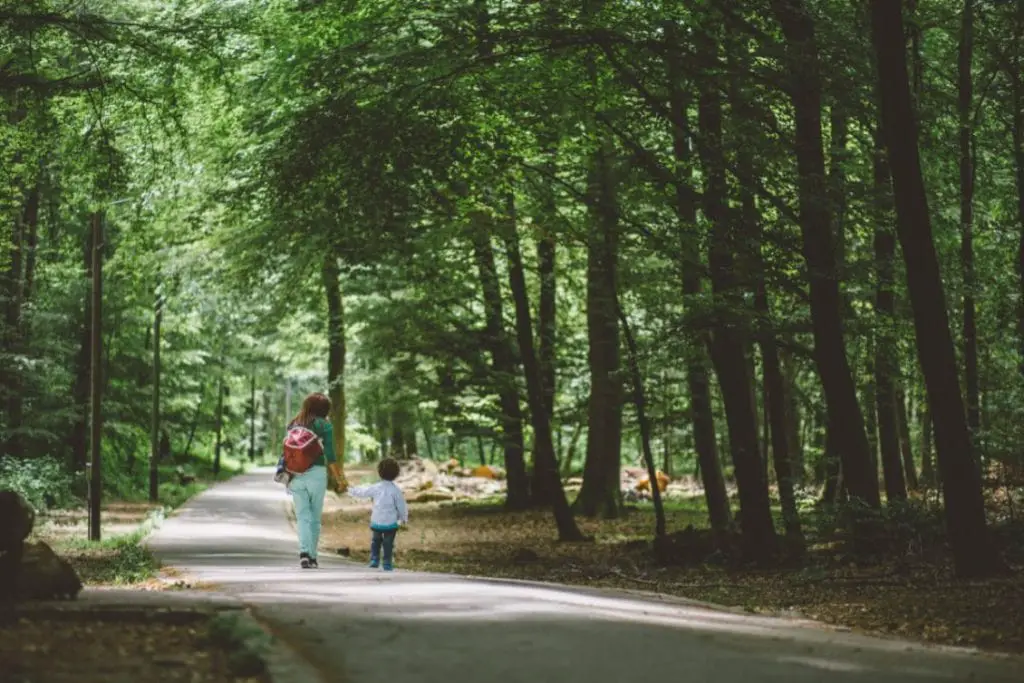The stats about children playing outdoors is gloomy. In many parts of the UK, children spend less than 2 hours per week outdoors. It’s not much different over in the US, where the average child spends up to 8 hours behind a screen. In the past children grew up with the ability to process one screen at a time. Mostly television. Today’s children can process multiple screens at a time. They’re adapting to a new environment. One that requires plug points and electricity.

While this may be a good thing in moderation, it can be a problem in excess. It’s been linked to your children become smarter. If you’d like to know more about the effects of screen time, I touch on it in my article on best podcast for kids.
The most critical thing that’s being depleted with all this screen time is a disconnection with nature. This disconnect diminished a child’s appreciation and understanding of the natural world that we live in. Natural resources need to be respected. They are finite unless we give them room to continue to grow, and teach our children to be stewards of nature.
Parents are busy and technology is a great way to keep kids entertained. But at what expense? Parents will spend a fortune on their child’s brain development, buying all kinds of technology and games that support this growth. However, nature offers this type of holistic stimulation…for free.
This article is about why nature is important to the development of your child and what you can do to start promoting these interactions with nature. You don’t need to be an outdoorsman to help your children appreciate nature. You just need to lead the way.
Benefits of Being in Nature
Nature has a rhythm that poets have been writing about since the dawn of mankind. It holds secrets to education, growth and development that we only notice and realize when our children start showing deficiencies. Many of these deficiencies can be helped by engaging with nature. Here are more of the benefits that you may not know about.
Physical Benefits
Being out in nature requires participation on so many levels. Gross-motor skills are developed in climbing trees, running on uneven terrain and digging in the ground. Jumping, running, slipping and sliding, the list is endless. Being outdoors builds vigor, allowing your children to become naturally fitter. Being in nature also builds up a child’s Vitamin D levels, strengthening their bones.
A child’s tactile receptivity is also challenged by the outdoors. There are so many textures, shapes, weights and sizes that they’re growing their fine-motor coordination through everything that they’re handling and feeling under their feet.
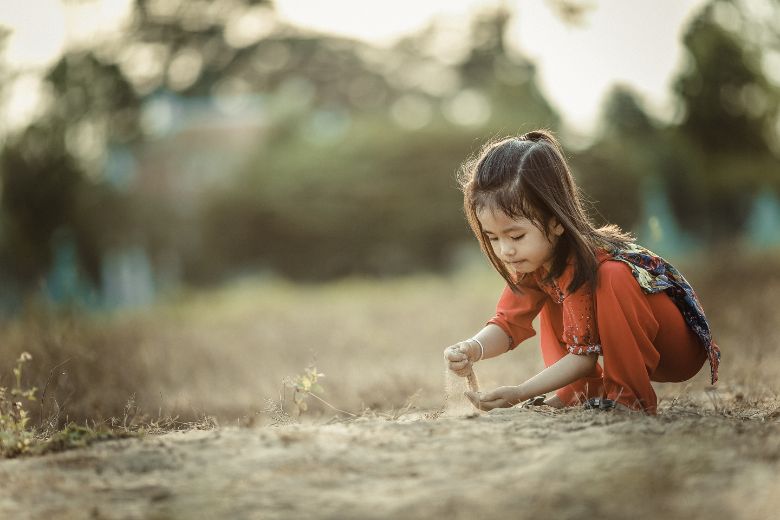
However, the most important aspect is that through outdoor activity, their bodies release a chemical called endorphins, giving your children a sense of happiness and fulfillment. Endorphins also diminish stress and other negative moods by countering levels of cortisol.
Cognitive Benefits
Brain stimulation happens on multiple levels in nature. The problem-solving required to navigate around a garden, through a bush, over a stream, and up a tree is astounding. Want to talk about multi-tasking? Nature offers an abundance of opportunities to stretch your child’s attention. This teaches them how to prioritize, make decisions and take action. All their executive brain functions are employed and grown in outdoor play.
With regular interactions in nature, your child will also replenish their attention. The attention-restoration theory points out that watching a sunset, gazing through a river, or other activities that you do out in nature, build back your attention. This is great for children who struggle to channel their attention. Nilda Cosco presented an insightful TEDx talk on how nature teaches children. I recommend watching it.
Emotional Benefits
Nature requires children to be present. The sounds, scents, sensations and living things create a space where it’s very difficult to be trapped in thoughts and emotions. Children enjoy screen time because of the heightened stimulation and rewards systems used to keep them involved. Nature’s stimulation is very different. It’s far more subtle, but the more time your children spend out in nature, the more they will come to appreciate the quiet that it holds.
This quiet is what is severely lacking in a loud world. Emotionally, nature will help cultivate happiness, appreciation for birdlife, plants and trees and the overall connections that human beings have to the earth. When approached in the right way, outdoor time can also be calming, decrease anxiety and become a space for social interaction, where children can build their relationships with family, friends and pets.
Creative Benefits
A child’s imagination comes alive in nature. The problem with screen time and electronic games is that they have limitations. They’re incredibly colorful and stimulating, but most of the work is already done for your child. They’re passive observers in what they watch, even in what they play.
Nature demands resourcefulness, imagination and creative solutions. A sound behind a bush could be more than just a bird plucking through the underbrush. It could be a secret doorway to an imaginary world. A child’s imagination is a powerful tool to grow. Nature is imagination’s breeding ground.
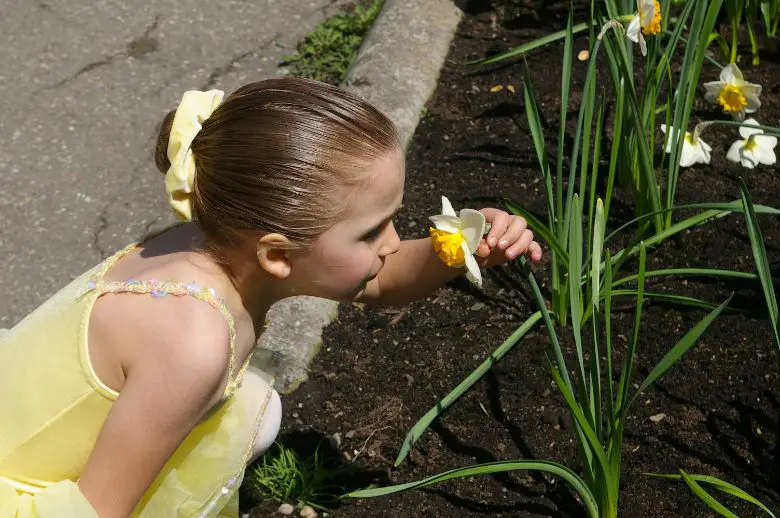
A Father’s Role in Nature Immersion
1. Lead from an Authentic Place
Left to their own devices, children will gravitate to what they know. They’ll be pulled towards what is comfortable for them. Merely telling your child, “Go play outside,” is not enough. You need to help them build up some kind of outdoor momentum. As a father, you need to join them, leading the journey into nature first. Before you even start to get your children involved in nature, ask yourself, “Do I have an appreciation for nature?”
There is no fooling a child. If you’re making them spend time outdoors when you don’t even enjoy being outside, they’ll take it as punishment. It’ll feel forced and you’ll both be asking, “How long are we going to be out here?”
Take some time alone outdoors. What can you appreciate about it? What do you find fascinating? The moment that you personally find an interest in nature, you’re ready to bring your child into the experience.
2. Schedule Outdoor Time Daily
Without scheduling something, you’re doomed to never do it. When you schedule outdoor time into each day, you train yourself and your child to prioritize it. Maybe every day isn’t realistic for you. If that’s the case, schedule it once or twice a week, for a longer period of time. Go camping somewhere with your favorite hiking carrier, toys, battery-operated baby monitor for camping, or other accessories to get full immersion in nature. Find a few hours over your weekend where you can visit a public park or a nature reserve near you. By prioritizing this time in nature, you teach your children to value it, too.
3. Ask the Questions, Play the Games
Nature can be vast. If your child is a little hesitant and doesn’t know where to start, prompt them with questions. “Would you like to climb this tree?”
“What’s in that water over there?”
“Did you hear the birds in those bushes?”
Questions help to give your child something to focus on. And once they have a focus, they will want to explore it. Go on and enjoy the time with them. Play the games that they initiate. Hear what they have to say. Laugh with them and share stories. Nature is the perfect setting to create unforgettable father-child moments.

4. Offer Support when Necessary
Climbing a tree can be difficult for a child. Offer support in case they fall. If they want to cross a river, offer your hand for balance. There’s no need to do it for them, but they’ll need a little help in the beginning. As a father, you’re the equipper, teaching them that they have skills that they didn’t even know about. After a few times, they’ll be able to do it all alone.
Offering support can also mean offering them another person to help out, taking them to nature if you cannot make it, e.g. like me when I want to go to Planet Fitness with no daycare. I still go to the gym as a dad since in the long run only a healthy father can be supporting them.
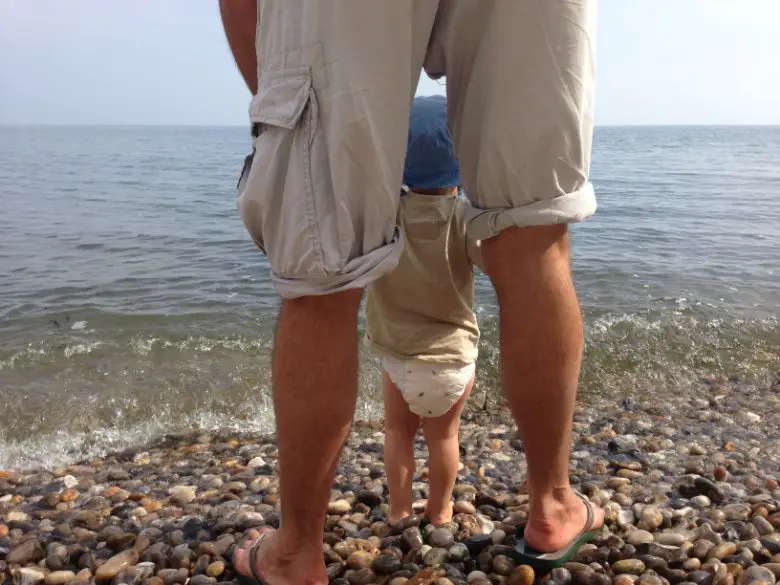
5. Let Them Experience Emotions In Nature
Nature is not a library. Allow your children to laugh and shout and scream as they play. Do the same yourself. Yell like Tarzan and run like someone’s chasing you. Allowing your children to experience their emotions builds up their emotional intelligence. It also releases pent-up emotions, allowing them to feel free.
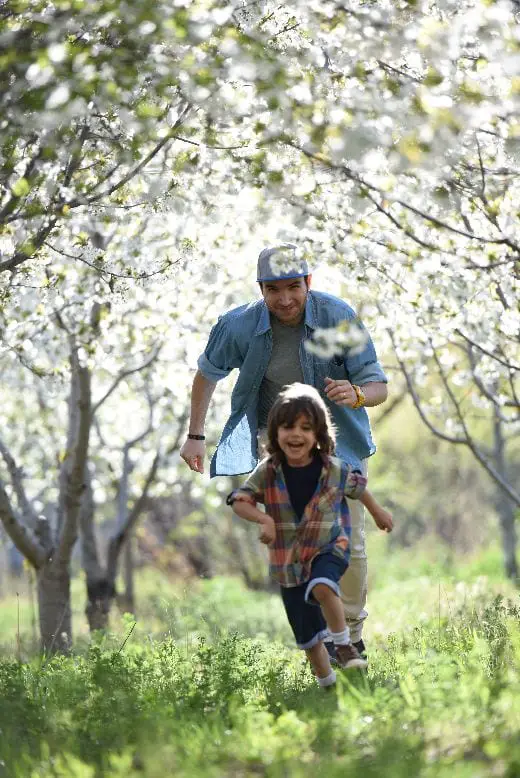
Activities and Explorations
There are so many things that you can do with your children out in nature. The key is to understand the role you play in each activity and choose something that you both enjoy. You could decide to build a bird feeder together, watch the birds eat from it, and replenish the fruit and nuts each week when they’ve eaten it all. You could spend time making pictures with twigs, dried leaves, and forest debris. You could cloud-watch and talk about what each of you is seeing. The opportunities to explore nature are literally boundless. And your children become smarter by interacting with the natural world.
Final Thoughts
As much as technology will be a part of the world, nature will always be the greater context in which our children live. It’s the base of all experiences. However, industrial age thinking is eroding this base, usurping natural resources, and leaving the earth barren. When we teach our children to appreciate nature, animals, birds, plants, we teach them the fundamentals of being stewards of the earth. But it starts with us. We need to take responsibility for the start of their experience and relationship with nature.
Last but not least, some parents go to the gym
